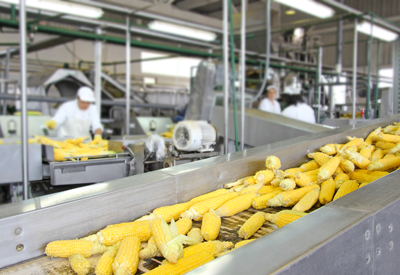Food Processing Pollution Prevention
 Food processing is a vital part of the Minnesota economy, providing jobs to 46,000 people throughout the state. Excellent food products are supplied by the industry, but processing these products comes with challenges; the industry emits over 4.5 million pounds of TRI chemicals each year. MnTAP is conducting a project aimed towards optimizing chemical use, conserving water, lowering strength charges, and saving energy for Minnesota food processors.
Food processing is a vital part of the Minnesota economy, providing jobs to 46,000 people throughout the state. Excellent food products are supplied by the industry, but processing these products comes with challenges; the industry emits over 4.5 million pounds of TRI chemicals each year. MnTAP is conducting a project aimed towards optimizing chemical use, conserving water, lowering strength charges, and saving energy for Minnesota food processors.
Opportunity
- No cost waste reduction assessments for Minnesota food processors
- Intern projects focused on in-depth waste reduction strategies
Conserve Resources
MnTAP is providing assessments in an effort to reduce chemicals, conserve water, lower strength charges, and save energy.
Focus areas:
- Review cleaning procedures and reduce hazardous chemical use.
- Identify opportunities to conserve water.
- Reduce process related food waste and related wastewater strength charges.
- Find ways to save energy.
Webinar
Improve your Bottom Line: Cut Food Processing Waste, Water, & Energy
The Bottom Line How MN food processors are cutting costs through waste prevention and energy and water conservation
Past Intern Projects
Balchem/Sensory Effects, Sleepy Eye, Wesley Graham
Goal: Improve heat recovery and water conservation at a food processor.
Intern Summary | Presentation
Lamb Weston RDO Frozen, Park Rapids, Micah Calderon
Goal: Optimize water, energy and chemical use at a potato product facility.
Intern Summary | Presentation
Kerry Ingredients and Flavours, Rochester, Denzel Bibbs
Goal: Improve energy and chemical use efficiency.
Intern Summary | Presentation
Seneca Foods, Rochester, Daniel Chang
Goal: Reduce product loss and improve water and chemical use efficiency.
Intern Summary | Presentation
Lorentz Meats, Cannon Falls, Nicholas Drews
Goal: Reduce energy use in the refrigeration system and other process energy uses, as well as water and chemicals used for multiple cleaning and sanitation operations.
Intern Summary | Presentation
Lloyd’s BBQ, Mendota Heights, Ayotunde Olatunbosun
Goal: Water conservation, waste reduction, and energy efficiency opportunities in the meat packaging process.
Intern Summary | Presentation
Gedney Foods, Chaska, Ryan Venteicher
Goal: Reducing water use and wastewater created during product processing as well as improving efficiencies, reducing salt use, and reducing chloride content in the wastewater.
Intern Summary | Presentation
Contact Us
The Minnesota Technical Assistance Program located at the University of Minnesota is a nonregulatory, confidential service geared towards conserving resources, improving efficiency, and reducing costs in Minnesota businesses. Give us a call to schedule your no-cost assessment!
- Matt Domski – Waste Prevention Specialist
612-624-5119 | mdomski@umn.edu - Jon Vanyo – Engineer
612 – 624 – 4683 | jvanyo@umn.ed